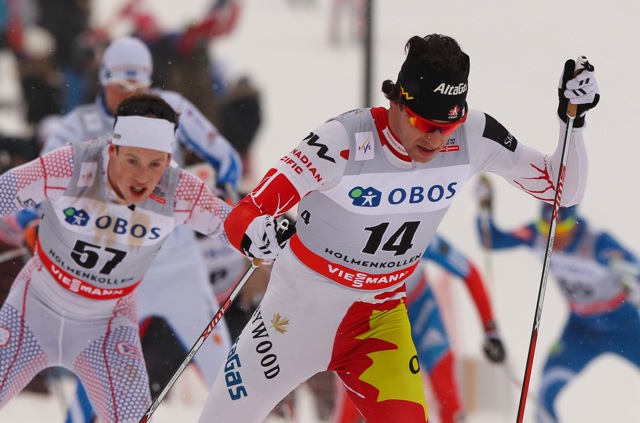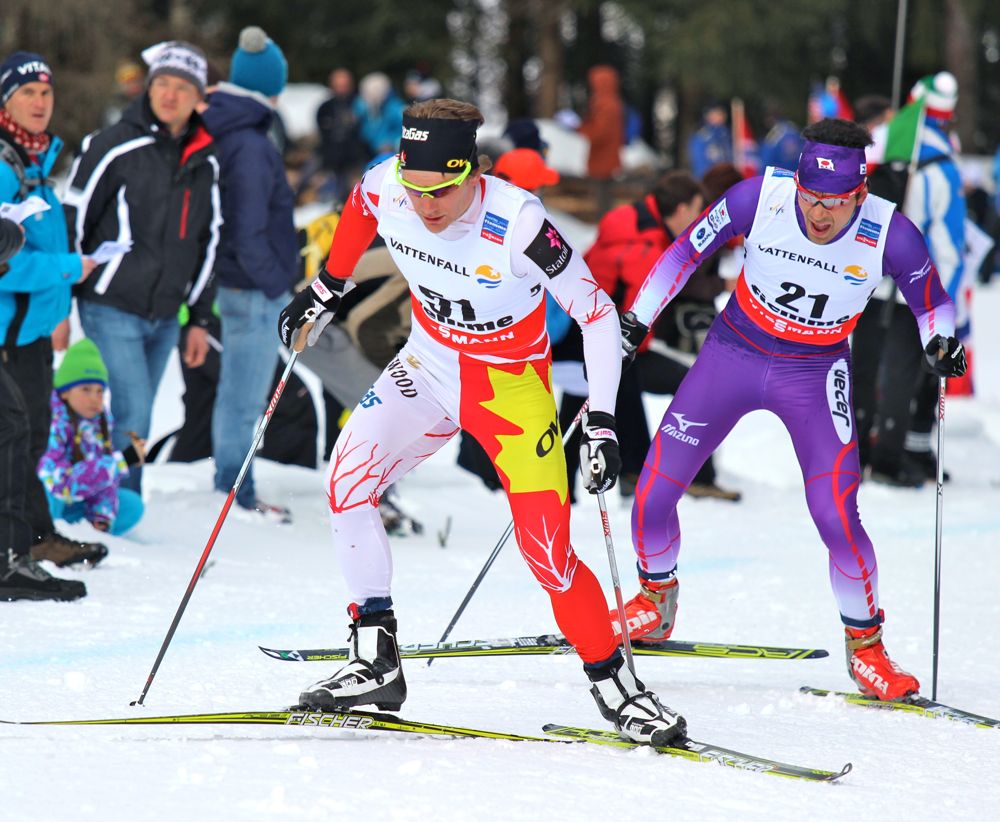
No matter how you sliced it, Holmenkollen was never going to be a cakewalk. Marked by a relentless, three-kilometer climb out of the start, you had better be feeling good from the beginning if you wanted to finish well in the World Cup 50 k freestyle mass start in Oslo, Norway.
And your skis better be fast. The Canadian men struggled with both on Saturday, working hard to stay with a group for six strenuous 8.3 k loops. None kept contact for the duration, and Devon Kershaw led the group in 29th, 5:43.7 back from Russian winner Alexander Legkov.
In his first time back in the individual top 30 since the Davos World Cup on Feb. 16, Kershaw wasn’t thrilled with his result. It was a good finish after skiing in the top 30 and 40 for much of the race, but it wasn’t what he was looking for.

“Wow, that was hard,” Kershaw wrote in an email. “Our skis were pretty slow so that made it doubly tough. Ah well, the body felt pretty good – for this year anyway.”
Canada’s World Cup veteran and last year’s overall World Cup runner-up, Kershaw, 30, has been dealing with stomach issues since early this year. It led him to a disappointing World Championships, after which he sat out some races before last Wednesday’s World Cup classic sprint in Drammen, Norway. There, he placed 49th.
At this point, Kershaw wrote that he’s looking forward to his last week of racing then taking a “big/good ol’ rest.” The World Cup Finals start Wednesday with a classic sprint in Stockholm, Sweden, and continue next weekend in Falun. Kershaw and his teammates Ivan Babikov, Lenny Valjas and Alex Harvey all made the top 50 to qualify.
Babikov – who skied with Kershaw for most of Saturday’s 50 k – is also feeling the strain of the season. Sick before World Championships, Babikov recovered for a career-best fourth in the 15 k freestyle in Val di Fiemme, Italy, but did not finish the 50 k classic mass start. After the 1 ½-weeklong event, Babikov traveled home to Canmore, Alberta, picked up another cold and tried to kick it before Holmenkollen.
The 32-year-old finished 33rd on Saturday, 6:53.4 back. It was hardly his best result in cross-country’s ultimate distance race, but it wasn’t his worst either. At last year’s Holmenkollen 50 k classic, Babikov did not finish. Kershaw placed 10th and teammate Alex Harvey was 29th.
“I feel happy that I finished,” Babikov said. “Holmenkollen’s always tough, but today conditions were really slow and skis were really slow, and it was really hard to fight.”
At the same time, with so many spectators lining the course, he said it was hard to drop out. Many were grilling outside tents and makeshift camps they had set up for the occasion, which made it a little smoky and the snow slightly dirty in those spots, but Babikov said it was all part of the experience.
“That’s the funnest it gets for a 50 k,” Babikov said. “Holmenkollen is the best way to do it. It’s super tough and probably the hardest, but it’s also probably the funnest. Such a great spirit.”
Babikov worked with Kershaw throughout, starting with him in the pack and sticking within 30 seconds of the leaders – minus some frontrunner surges – for the first half of the race. By 30 k, Babikov and Kershaw were still hanging in the mid 30s, while Harvey had slipped back from the mid 20s to join them.
After the fourth lap at 33.3 k, Harvey stopped racing because of lower-back pains, which have plagued him in long distances before. Babikov tried to hang with Kershaw, but lost him before the last lap.
“I was skiing with Kershaw all the way and we were changing [leads],” he said. “Because I’ve been sick last week and barely skied I think maybe it kind of kicked in after the fifth lap. I started cramping really bad and I couldn’t keep going at the same pace so I had to dial it down to finish. It was hard to fight. After that I basically skied by myself.”
Even though their skis weren’t ideal, conditions were inevitably slow with some fresh snow on top of a dry base, he explained.
“It’s always really weird conditions in Holmenkollen,” Babikov said. “It’s always a challenge to find the wax. Maybe it’s our skis, we never maybe test for that snow, I don’t know, but it’s always been tough for us.”
According to Canadian head coach Justin Wadsworth, his small staff had limited time to test skis on the new powder with nordic combined racing before.
“The skis were not the best today, but this was the same for many teams it seemed,” Wadsworth wrote in an email. “I think our skis were fine around the stadium, but not so much out on the rest.”
In a Cross Country Canada press release, he racked up the team’s overall performance as a “rough day,” but it wasn’t because they weren’t physically and mentally prepared.
“Sometimes it is frustrating when the bodies feel good, but you just don’t get the result,” Wadsworth said.
Harvey was disappointed not to finish, but reasoned it was the best decision given his race schedule next week.
“Any time you don’t finish a race, it’s one of the hardest things, for me at least, to take as an athlete,” Harvey said. “I was just thinking about the fact that we’re racing four days from now and it’s four races over a five-day period.”
Skiing with the lead group for several laps, Harvey realized how hard he was working to do so. The pace wasn’t too bad, other people were breathing hard, but his slower skis on the downhill made for a lot of work on the flats. Two laps in, his back started to cramp for the third time this season (after the Tour de Ski 35 k and Lahti World Cup 15 k).
“My back started hurting from pushing hard and I was just also not having a great day,” Harvey said. “The third lap, my back was cramping pretty badly and I was already pretty much outside the points and I knew it wasn’t going to get better, it was going to get only worse, so I just pulled the plug to try to save something for the Final.”
Typically, Harvey’s back issue – which stems from tight hip flexors pulling at his lower back – has been more problematic in classic races that involve a lot of striding. It doesn’t come up until at least 10 k in, so in places like Lahti, he just pushed through the final five kilometers.
“You can tough it out when there’s 12 minutes left, but when there’s another hour to go it’s a bit different,” Harvey said. “It’s better than last year, but it’s always something that can be haunting me. It’s always close.”
Also racing for Canada, Alberta World Cup Academy teammates Graeme Killick placed 55th and Michael Somppi was 57th. Jess Cockney did not finish after getting lapped on the second loop.
Harvey was 27th after using one of five possible ski changes at the halfway point. Asked how he felt about the added distance skiers had to cover if they switched skis (which took about 25 seconds) – new to World Cup 50 k’s – Harvey said it was good for anyone but the leaders, who had to pick up the pace to stay in front.
“For us in the pack, it makes it somewhat easier because those guys up front bursting, they have to recover after from such a hard effort,” he said. “You’ve got to know that they’re going to chill. They can’t keep going that pace the whole way.”
Alex Kochon
Alex Kochon (alexkochon@gmail.com) is a former FasterSkier editor and roving reporter who never really lost touch with the nordic scene. A freelance writer, editor, and outdoor-loving mom of two, she lives in northeastern New York and enjoys adventuring in the Adirondacks. She shares her passion for sports and recreation as the co-founder of "Ride On! Mountain Bike Trail Guide" and a sales and content contributor at Curated.com. When she's not skiing or chasing her kids around, Alex assists authors as a production and marketing coordinator for iPub Global Connection.



